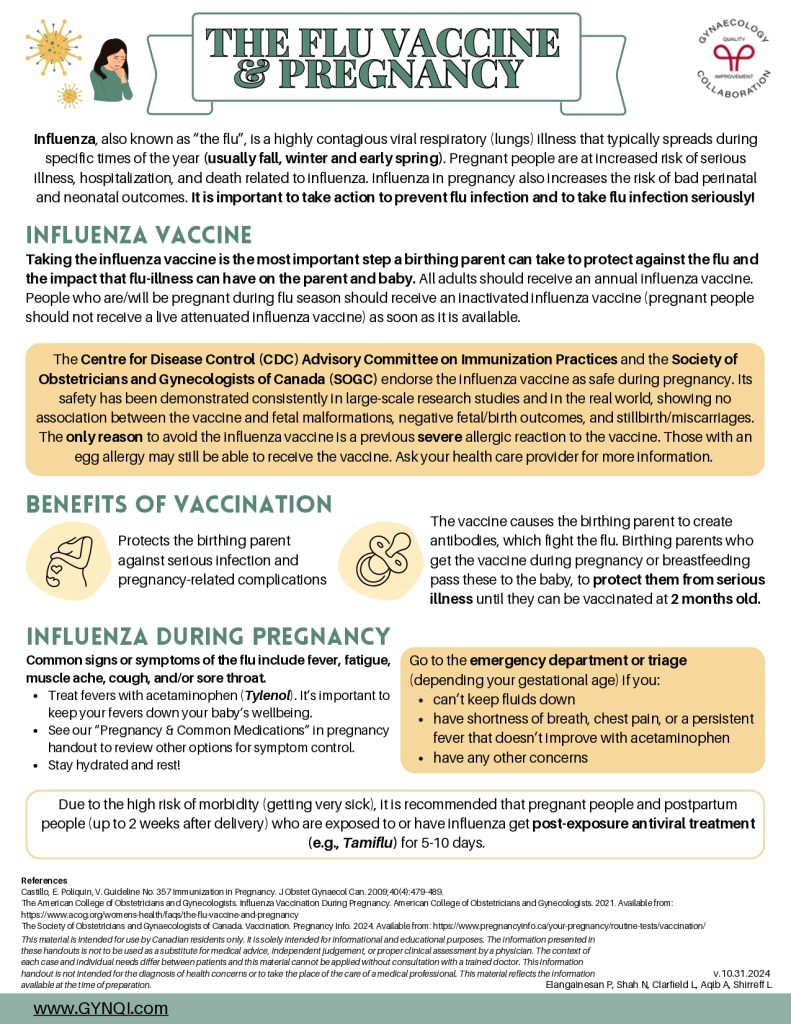
The Flu Vaccine & Pregnancy
Influenza, also known as “the flu”, is a highly contagious viral respiratory (lungs) illness that typically spreads during specific times of the year (usually fall, winter and early spring). Pregnant people are at increased risk of serious illness, hospitalization, and death related to influenza. Influenza in pregnancy also increases the risk of bad perinatal and neonatal outcomes. It is important to take action to prevent flu infection and to take flu infection seriously!
Influenza Vaccine
Taking the influenza vaccine is the most important step a birthing parent can take to protect against the flu and the impact that flu-illness can have on the parent and baby. All adults should receive an annual influenza vaccine. People who are/will be pregnant during flu season should receive an inactivated influenza vaccine (pregnant people should not receive a live attenuated influenza vaccine) as soon as it is available.
The Centre for Disease Control (CDC) Advisory Committee on Immunization Practices and the Society of Obstetricians and Gynecologists of Canada (SOGC) endorse the influenza vaccine as safe during pregnancy. Its safety has been demonstrated consistently in large-scale research studies and in the real world, showing no association between the vaccine and fetal malformations, negative fetal/birth outcomes, and stillbirth/miscarriages. The only reason to avoid the influenza vaccine is a previous severe allergic reaction to the vaccine. Those with an egg allergy may still be able to receive the vaccine. Ask your health care provider for more information.
Benefits of Vaccination
- Protects the birthing parents against serious infection and pregnancy-related complications
- The vaccine causes the birthing parent to create antibodies, which fight the flu. Birthing parents who get the vaccine during pregnancy or breastfeeding pass these to the baby, to protect them from serious illness until they can be vaccinated at 2 months old.
Influenza During Pregnancy
Common signs or symptoms of the flu include fever, fatigue, muscle ache, cough, and/or sore throat.
- Treat fevers with acetaminophen (Tylenol). It’s important to keep your fevers down your baby’s wellbeing.
- See our “Pregnancy & Common Medications” in pregnancy handout to review other options for symptom control.
- Stay hydrated and rest!
Go to the emergency department or triage (depending your gestational age) if you:
- can’t keep fluids down
- have shortness of breath, chest pain, or a persistent fever that doesn’t improve with acetaminophen
- have any other concerns
Due to the high risk of morbidity (getting very sick), it is recommended that pregnant people and postpartum people (up to 2 weeks after delivery) who are exposed to or have influenza get post-exposure antiviral treatment (e.g., Tamiflu) for 5-10 days.



